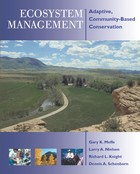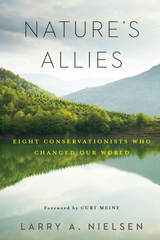
Today's natural resource managers must be able to navigate among the complicated interactions and conflicting interests of diverse stakeholders and decisionmakers. Technical and scientific knowledge, though necessary, are not sufficient. Science is merely one component in a multifaceted world of decision making. And while the demands of resource management have changed greatly, natural resource education and textbooks have not. Until now.
Ecosystem Management represents a different kind of textbook for a different kind of course. It offers a new and exciting approach that engages students in active problem solving by using detailed landscape scenarios that reflect the complex issues and conflicting interests that face today's resource managers and scientists. Focusing on the application of the sciences of ecology and conservation biology to real-world concerns, it emphasizes the intricate ecological, socioeconomic, and institutional matrix in which natural resource management functions, and illustrates how to be more effective in that challenging arena.
Each chapter is rich with exercises to help facilitate problem-based learning. The main text is supplemented by boxes and figures that provide examples, perspectives, definitions, summaries, and learning tools, along with a variety of essays written by practitioners with on-the-ground experience in applying the principles of ecosystem management.
Accompanying the textbook is an instructor's manual that provides a detailed overview of the book and specific guidance on designing a course around it. Download the manual here.
Ecosystem Management grew out of a training course developed and presented by the authors for the U.S. Fish and Wildlife Service at its National Training Center in Shepherdstown, West Virginia. In 20 offerings to more than 600 natural resource professionals, the authors learned a great deal about what is needed to function successfully as a professional resource manager. The book offers important insights and a unique perspective dervied from that invaluable experience.

In eight engaging and diverse biographies—John Muir, Ding Darling, Aldo Leopold, Rachel Carson, Chico Mendes, Billy Frank Jr., Wangari Maathai, and Gro Harlem Brundtland—we meet individuals who have little in common except that they all made a lasting mark on our world. Some famous and some little known to readers, they spoke out to protect wilderness, wildlife, fisheries, rainforests, and wetlands. They fought for social justice and exposed polluting practices. They marched, wrote books, testified before Congress, performed acts of civil disobedience, and, in one case, were martyred for their defense of nature. Nature’s Allies pays tribute to them all as it rallies a new generation of conservationists to follow in their footsteps.
These vivid biographies are essential reading for anyone who wants to fight for the environment against today’s political opposition. Nature’s Allies will inspire students, conservationists, and nature lovers to speak up for nature and show the power of one person to make a difference.
READERS
Browse our collection.
PUBLISHERS
See BiblioVault's publisher services.
STUDENT SERVICES
Files for college accessibility offices.
UChicago Accessibility Resources
home | accessibility | search | about | contact us
BiblioVault ® 2001 - 2024
The University of Chicago Press









